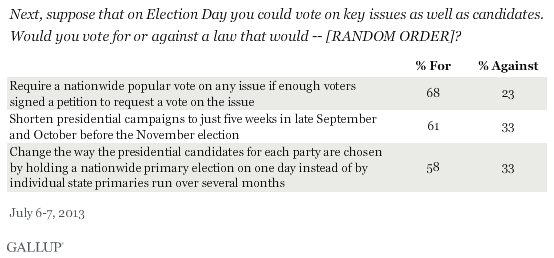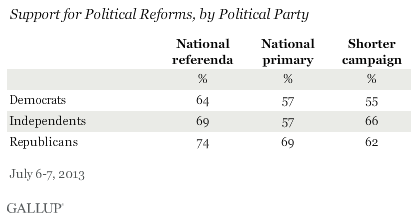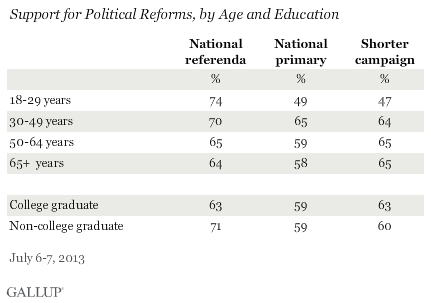PRINCETON, NJ -- A majority of Americans back three political reform ideas, including 68% who favor national referenda on key issues if enough voters sign a petition to request a popular vote on the issue. Roughly six in 10 favor a shortened presidential campaign lasting five weeks in the fall of an election year and a nationwide primary election to select each party's candidates for president.

The July 6-7 poll comes at a time when Americans are highly frustrated with the federal government. The reforms are three Dr. George Gallup promoted in a 1978 "Reader's Digest" article entitled "Six Political Reforms Most Americans Want." In addition to the three reforms tested this month, the other reform ideas Dr. Gallup advanced were congressional term limits, abolishing the Electoral College to elect the president based on the popular vote, and campaign finance reform. Back then, a majority of Americans favored all six reforms.
At various times this year, Gallup has retested public support for the reforms using slightly different question wording and format and found that half or more of Americans still favor each of them. In January, Gallup found 75% in favor of term limits and 63% for abolishing the Electoral College. Last month, Gallup found 79% supporting overall limits on campaign spending and 50% backing a publicly financed campaign system.
The latest update shows national issue referenda, with 68% support, trailing term limits and campaign spending limits in terms of popularity of the proposals. Like term limits, issue referendum procedures are currently in place in many U.S. states, allowing voters to directly decide on key issues rather than having elected representatives in the legislature decide all issues.
Since Dr. Gallup's time, primaries have grown and political conventions have decreased in importance in terms of choosing presidential nominees. As primaries have grown in influence, numerous reforms to the process have been considered or been put into place. For example, both parties now allow Nevada and South Carolina to hold early primaries to increase the racial, ethnic, and regional diversity of early primary state electorates.
Also, in 2012, the Republican Party introduced rules to discourage states from holding early primaries to bring more order to the scheduling of primaries. The idea of a national primary has not been widely discussed in recent years, perhaps out of deference to the political tradition of starting the presidential nominating process in Iowa and New Hampshire. But, 58% of Americans are supportive of a nationwide primary to replace the current structure of sequential state primaries run over a several-month period.
Republicans Somewhat More Likely to Favor Reforms
Although there are not large political differences in support for the three reforms tested most recently, Republicans do show at least slightly more support for each than Democrats. The largest party difference comes in the percentage favoring a national primary, which 69% of Republicans and 57% Democrats support. Independents are less likely to favor a national primary and national issue referenda and slightly more likely to favor a shorter presidential campaign than Republicans.

Previously, Gallup found Republicans more supportive than Democrats of term limits, less supportive than Democrats of government-funded campaigns, and only minor party differences on abolishing the Electoral College and campaign spending limits.
Younger Americans are much less supportive of shortening the presidential campaign and less likely to favor a national primary than older Americans. However, younger Americans are a bit more positive about national issue referenda.
In addition, college graduates find national issue referenda a bit less appealing than non-college graduates.

Implications
Americans have long supported specific reforms to the political system that would increase the influence of average citizens and decrease the sway of elected representatives, political parties, and special interest groups. These reforms include national issue referenda, campaign finance reform, and basing the presidential election outcome on the popular vote. Perhaps it is not surprising Americans would favor steps that would make their voices more influential in determining government policy.
However, nearly 40 years after Dr. Gallup proposed several reform ideas, few of these have become reality in the U.S. political system. Certainly, it is difficult to amend the constitution to change some of the basic ways the system operates, or even to pass legislation to change long-standing practices. Legal challenges have also thwarted or weakened legislative attempts to reform the system, such as campaign finance reform laws. In some cases, such as with the presidential primary system, the government and political parties have made reforms but stopped short of more radical change along the lines of the nationwide primary Dr. Gallup advocated. And although the federal government has not adopted referendum or term limits, many U.S. states have in recent decades.
Thus, it is unclear if Dr. Gallup's favored reforms will ever become reality on a nationwide basis, but Americans still largely view them as worthy ideas.
Survey Methods
Results for this Gallup poll are based on telephone interviews conducted June 6-7, 2013, on the Gallup Daily tracking survey, with a random sample of 1,017 adults, aged 18 and older, living in all 50 U.S. states and the District of Columbia.
For results based on the total sample of national adults, one can say with 95% confidence that the margin of sampling error is ±4 percentage points.
Interviews are conducted with respondents on landline telephones and cellular phones, with interviews conducted in Spanish for respondents who are primarily Spanish-speaking. Each sample of national adults includes a minimum quota of 50% cellphone respondents and 50% landline respondents, with additional minimum quotas by region. Landline and cell telephone numbers are selected using random-digit-dial methods. Landline respondents are chosen at random within each household on the basis of which member had the most recent birthday.
Samples are weighted to correct for unequal selection probability, nonresponse, and double coverage of landline and cell users in the two sampling frames. They are also weighted to match the national demographics of gender, age, race, Hispanic ethnicity, education, region, population density, and phone status (cellphone only/landline only/both, and cellphone mostly). Demographic weighting targets are based on the March 2012 Current Population Survey figures for the aged 18 and older U.S. population. Phone status targets are based on the July-December 2011 National Health Interview Survey. Population density targets are based on the 2010 census. All reported margins of sampling error include the computed design effects for weighting.
In addition to sampling error, question wording and practical difficulties in conducting surveys can introduce error or bias into the findings of public opinion polls.
View methodology, full question results, and trend data.
For more details on Gallup's polling methodology, visit www.gallup.com.
